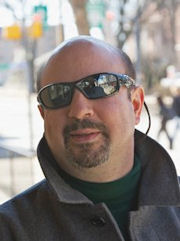by James A. Bacon
There is a fascinating sidebar to the Teresa Sullivan firing/rehiring at the University of Virginia that has gone unremarked upon in the Virginia press yet has inspired articles and blog posts among journalists and commentators following the Global Warming debate, including, recently, the Guardian newspaper in the United Kingdom.
The question is this: Was the Board of Visitor’s move to demand President Sullivan’s resignation linked in some way to the decision to hire or not to hire climatologist Michael Mann to UVa’s Department of Environmental Sciences?
Robert P. Geraci, a UVa history professor, explored the connection in an article published by the Guardian. Before getting to his article, let me first provide some background.
While employed by the University of Virginia, Mann authored the highly controversial “hockey stick” graph that purported to show a dramatic increase in average global temperatures in recent years, thus supporting the claims of many scientists that human-induced climate change was accelerating. During his tenure, Mann also engaged in correspondence with other Global Warming alarmists — and I use the word “alarmist” in the kindest sense, as in, he is alarmed by Global Warming (GW). Some of that correspondence subsequently was made public in the so-called Climate Gate scandal, which revealed how scientists in the Warmist camp conspired to suppress the views of skeptics. Mann later decamped to Pennsylvania State, where he continues to teach environmental science. A number of investigations have cleared Mann of wrong-doing, although GW skeptics ridicule them as biased and incomplete.
In April 2010, Attorney General Ken Cuccinelli requested UVa to hand over Mann’s email records, as part of an inquiry to see if he had committed fraud in the conduct of state-funded research projects. Many observers hoped for, or feared, that a data dump would reveal a mother-lode of emails in the same scandalous vein as Climate Gate. UVa officials refused. Cuccinelli’s quest for the Mann emails subsequently was picked up by the American Tradition Institute by means of a Freedom of Information Act request.
Now, back to Geraci’s narrative… In 2011, UVa’s Vice Rector Mark Kington and his wife donated $1.5 million to endow a chair in “environmental change.” That gift was matched by a contribution from UVa alumnus and hedge fund investor Paul Tudor Jones. In the spring of 2012, the Department of Environmental Science attempted to rehire Mann as the first Kington professor. That choice by a four-person search committee was confirmed by a majority of the department’s faculty members. Here’s where it really gets juicy. Writes Geraci:
But Mann never received an offer. According to a source in environmental sciences, the dean of UVA’s college of arts and sciences, Meredith Woo, refused to approve it. Such an intervention is a rare event. The department chair later revealed that Woo had indicated even before the vote that she would oppose hiring Mann. Some department members went over the dean’s head and appealed to Provost John Simon, but Simon supported the dean’s decision. (In June, Simon appeared to co-operate with the board, before switching his support to the protesting faculty.)
In protest, Geraci writes, an unnamed climate change researcher resigned.
It was soon thereafter, in June, that the UVa Board of Visitors demanded Sullivan’s resignation. By that time, Sullivan had spent $600,000 contesting the email requests. The Mann matter was never mentioned in the board’s official pronouncements, nor in any of board member emails uncovered through the FOIA process. Instead, the board cited Sullivan’s unwillingness or inability to craft a strategic plan that addressed pressing challenges facing the university, most notably online learning. However, two of the most vocal proponents of change were… Mark Kington and Paul Tudor Jones.
Coincidence? Geraci thinks not. “The possibility of a relationship between the two scandals, no doubt, warrants close investigation. Those who assume that the June coup was only about online education or business models because those concerns appear in board members’ emails need to remember that no communication bearing on personnel matters (either Sullivan’s or Mann’s) is subject to FOIA disclosure.”
Bacon’s bottom line: I am no fan of Mann’s, as faithful readers of this blog know. While his work may or may not be scientifically valid — I lack the credentials to judge — I do feel safe in characterizing him from his writings and interviews as an ideologue and a blowhard. I fully support ATI’s right to access his email, and I am resentful of the University’s expenditure of $600,000 to block the FOIA request. (For what it’s worth, about $100 a year, I have ceased donating to my alma mater for this very reason.) Furthermore, I was one of the few commentators to support the Board of Visitors assessment of the “existential threat” facing UVA, even if I did not approve of the shabby manner in which Sullivan was treated.
Be that as it may, I cannot help but share Geraci’s suspicion that there was a tie-in between the Mann matter and Sullivan’s hiring. The coincidence of timing and the involvement of both Kington and Jones seems too extraordinary to attribute to mere chance. Of course, coincidence does not constitute proof. But my instincts as a journalist tell me that there is more to the story than has been revealed so far. And the story is far too important to go untold.
Update: In response to reader feedback I have deleted any mention of a widely made claim that UVa turned over the emails of GW skeptic Patrick Michaels in response to a Greenpeace FOIA request. The University of Virginia denies the claim. Unable to independently verify it, I therefore omit it.




